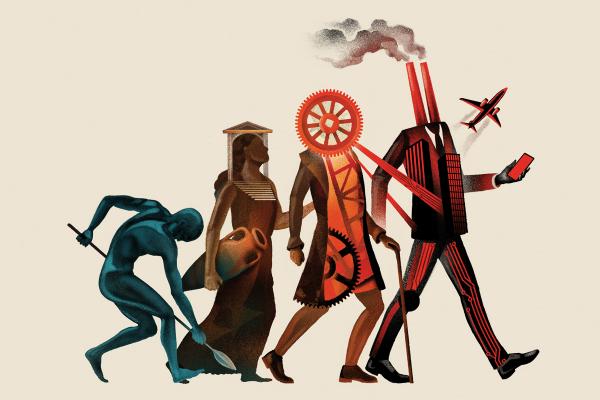PHILIP JENKINS’ REMARKABLE Climate, Catastrophe, and Faith: How Changes in Climate Drive Religious Upheaval leads off with Voltaire: “Three things exercise a constant influence over the minds of [humankind] — climate, government, and religion ... That is the only way of explaining the enigma of this world.”
Climate and geology are now the new prisms for our shared discernment of how we are to live in our own time and place as followers of Christ. We’re driven to centering climate because we can no longer live with the expectation of the balanced climate of the last 12,000 years, the geologic epoch called the late Holocene. We are now in a new geologic epoch: the Age of the Human, or the Anthropocene.
Anthropocene reality leaves Christian ethics nowhere to hide. Nowhere to hide because unprecedented cumulative human powers doubled down on planet-spanning changes that launched the first geological epoch created by human choice and action. The fact that human choice and action has done this means that everything, including extinction, turns on ethics. As Christians, we can look away and abdicate our responsibility, but we cannot escape the massive human presence that lines out our lives — and all life. We’ve become totalizing creatures. We humans are, for the first time, both ark and flood.
This extraordinary power has been recognized for a while. In 1944, Dietrich Bonhoeffer wrote that the unprecedented powers of modern science and technology led to a world in which “it all comes down to the human being,” a world where “everything turns upon humanity.” He thus set out to reconceive human responsibility for a world that had come of age. For Bonhoeffer, “world come of age” was not a statement of moral maturity. It was a statement of moral accountability. People who legally come of age at 18 or 21 are accountable, whether they exercise their agency maturely or not. When everything turns on humanity, Bonhoeffer said, the whole human world has arrived at that point of accountability.
A current term for human powers and their collective impact is “assisted evolution.” But the phrase is deceptive because it hides the depth, breadth, and temporal reach of those powers. Does the phrase “assisted evolution” reveal that the carbon people produce has the ability to alter marine chemistry, flood coastlines, strip glaciers “to bare bones,” embolden deserts, warp the circulation of ocean currents, “supercharge extreme weather events,” and rearrange “the distribution of animal, plant, and microbial species across the globe,” as author David Farrier puts it? This isn’t evolution “assisted”; it’s evolution hacked and hijacked.
Read the Full Article

